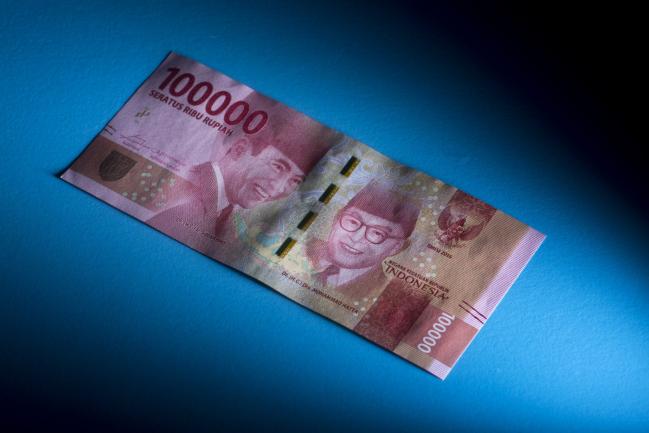(Bloomberg) -- Indonesia’s currency has been in a free-fall, even defying the central bank’s intense market intervention. The decline may now gather further pace as demand for dollars climb from companies set to repatriate dividends.
With the foreign investors adopting a flight-to-quality approach, even the high real returns on Indonesian sovereign bonds won’t be enough to stop the rush to exit, according to I Made Budhi Purnama Artha, head of treasury at Maybank Indonesia in Jakarta. Bank Indonesia should pump in more dollars to prevent the rupiah from declining further and protect investor confidence, he said.
The rupiah has gone from being Asia’s best performing currency in January to the worst in the past month as a global sell-off sparked by coronavirus concerns deepened. On Tuesday, the currency weakened past 15,000 to a dollar for the first time since the emerging market rout in 2018, raising concerns even a near-record foreign exchange reserve and all-out central bank intervention may fail to ease the turmoil.
Foreign investors have pulled more than $4 billion from rupiah bonds this year, on course for the biggest quarterly outflow ever, and have dumped about $600 million of shares, contributing to the third trading halt within a week. With the risk-off sentiment guiding investors, an expected interest rate cut on Thursday may do little to reverse the sell-off.
The trajectory of rupiah will “depend on whether global financial markets will still be as volatile as this month in the future,” said Wisnu Wardana, an economist at PT Bank Danamon Indonesia. “Our base scenario for Covid-19 is it lasts in Indonesia for six months with a peak in May. Pressure on rupiah might increase especially if other countries succeed to contain the virus while Indonesia struggles.”
The rupiah fell as much as 0.3% to 15,224 to a dollar on Wednesday, extending losses this year to almost 9%. The yield on benchmark 10-year rupiah bonds was at 7.58%, near its highest level since August, according to data compiled by Bloomberg.
A second wave of outflows from Indonesian markets may come in April and May, when foreign companies typically repatriate their dividends. But with the U.S. Federal Reserve cutting rates by 100 basis points, the high carry on Indonesian may lure bank investors and cushion the impact, Maybank’s Artha said.
Indonesian bonds are a barometer of risk appetite with foreign investors owning about 35% of the nation’s total sovereign rupiah bonds.
Here’s what market strategists and economists are saying about the outlook for rupiah:
David Sumual, economist at PT Bank Central Asia
“Bank Indonesia has to ensure sufficient liquidity between the central bank and banks, banks and banks, banks and the real sector at different costs. The intervention using forex reserves can be done because the needs of dollars for trade are declining. Aside from what the bank has been doing now, they still have bilateral swap agreements and the Chiang Mai Initiatives as a second line of defense. The virus pandemic needs a strong fiscal response. The government would also need to consider issuing a decree if it needs to exceed the legal budget deficit of 3% of GDP.”
I Made Budhi Purnama Artha, head of treasury at PT Maybank Indonesia
“During limited liquidity, demand for dollars is relatively pretty high, resulting in continued rupiah weakening. Dollar demand also triggered by the sell-offs by equity and fixed income investors. The cut in Fed fund rate will make Indonesian assets relatively attractive again and has the potential to attract bonds investors to re-enter Indonesian market. This can offset demand from fleeing equity investors and demand for dollars which tend to rise in April-June on dividend payment.”
Wisnu Wardana, economist at PT Bank Danamon Indonesia
“The most important thing is to maintain dollar supply domestically. Therefore, the policy to reduce foreign currency reserve requirement should be appreciated. Under the current circumstances, the best course of action is to guide the value of financial instrument to its fundamental level.”
Josua Pardede, economist at PT Bank Permata
“The strengthening of the U.S. dollar against the rupiah and other developing country currencies is influenced by the anticipated global economic slowdown from Covid-19 after it being declared a global pandemic. In addition, the very aggressive response of the U.S. central bank also gave a negative signal to emerging market financial markets, including the Indonesian capital market.
(Updates with rupiah performance in sixth paragraph.)
©2020 Bloomberg L.P.
